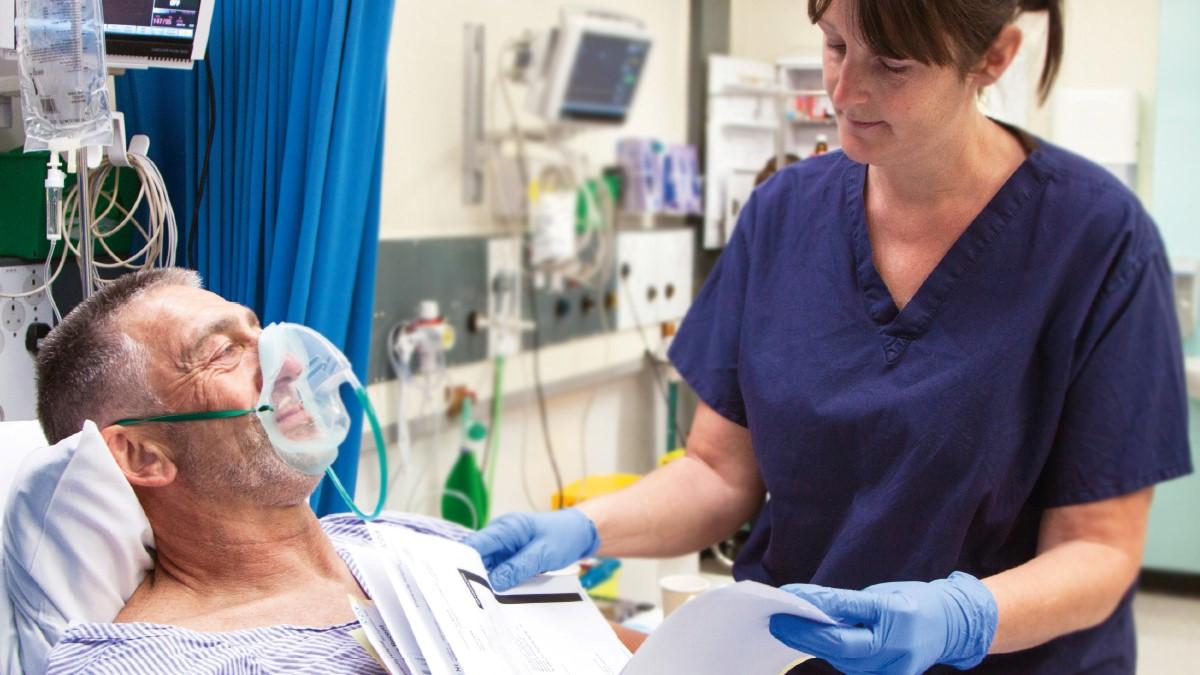Physiotherapy education before major abdominal surgery reduces lung complications

Why was this study needed?
Lung complications, such as pneumonia, are the most common serious adverse effects following upper abdominal surgery, reported in 10 to 50 per cent. The effects of anaesthesia-increased pressure within the abdomen, immobility and difficulty taking deep breaths due to pain means that parts of the lung are not adequately expanded, providing a haven for bacteria. People are usually advised to do breathing exercises, sit up out of bed and begin walking on the day after upper abdominal surgery to help prevent lung complications. This is supported by nurses and physiotherapists. Previous research showed mixed effects of breathing exercises on outcomes. This is the first prospective randomised controlled trial that aimed to see if a physiotherapy session before the operation reduced the risk of lung complications.
What did this study do?
This trial compared a pre-operative physiotherapy session with treatment as usual for 432 adults undergoing abdominal surgery. Both groups were given a patient information leaflet during a pre-operative outpatient clinic, with advice on hourly breathing and coughing exercises after surgery. They were also seen by a physio on the day after surgery to help them start walking and to remind them to do the breathing exercises.
Those allocated to physiotherapy had an additional 30-minute session during the six weeks before surgery. It included education about
Lung complications are reported in up to 50% of patients following upper abdominal surgery
stagnant lung secretions, and how to perform the breathing exercises.
Participants in the pre-operative physiotherapy group were younger (average age 63.4 versus 67.5 years) and slightly less likely to have diabetes, lung or heart disease.
What did it find?
- Pre-operative physiotherapy halved the rate of lung complications up to 14 days after surgery. A post-operative lung complication occurred in 12 per cent (27/218) of people who had received physio compared to 27 per cent (58/214) who had not (hazard ratio [HR] 0.48, 95 per cent confidence interval [CI] 0.30 to 0.75). The analysis was adjusted for age, surgery type and prior lung disease.
- Seven people would need to have pre-operative physiotherapy to prevent one post-operative lung complication (95 per cent CI 5 to 14).
- Physiotherapy also halved the rate of hospital-acquired pneumonia, which occurred in eight per cent (18/218) of the physiotherapy group versus 20 per cent (42/214) of the control group (adjusted HR 0.45, 95 per cent CI 0.26 to 0.78).
- There was no difference in length of hospital stay, hospital readmissions; patient-reported complications at six weeks, or deaths up to one year.
What does current guidance say on this issue?
No national guidelines on pre-operative physiotherapy for abdominal surgery are available. However, physiotherapy and early mobilisation is a component of the enhanced recovery programme for people having major surgery.
Local NHS trusts have patient information leaflets on physiotherapy after abdominal surgery, which recommend deep breathing exercises and coughing. They also advise walking on the day after surgery and keeping a diary of distances achieved each day.
What are the implications?
The combination of in-person coaching – and providing this before surgery – may be crucial to the improvements seen. Both groups were reminded by a physio post-operatively to do breathing exercises as directed in the leaflet, but they received no further instruction. If people have a greater awareness of the importance of breathing exercises and have been shown how to do them before surgery, then they can put them into practice straight after surgery. This non-invasive intervention was clinically effective, and though a cost-analysis was not performed, pre-operative sessions could potentially be done in a group format to make the best use of resources.
The full NIHR Signal and additional expert commentary was published on 3 April 2018
Expert view:
Charlotte Pereira Clinical specialty lead – transplantation, Royal Brompton & Harefield NHS Trust and senior teaching fellow, University College London
There is an increasing interest in physios providing education, breathing training and exercise to patients awaiting major surgery, with the aim of reducing respiratory complications post-operatively. In recent years, a lack of evidence for pre-operative interventions has meant physiotherapy resources have been targeted at post-operative care.
This research found that pre-operative physiotherapy (education and breathing training) was associated with a reduction in lung complications post-operatively. Despite randomisation, there were differences between groups, as the control group had a higher proportion of high-risk patients. Despite this, these findings are promising.
It is essential that NHS services demonstrate cost-effectiveness, and long-term value, particularly given their financial pressures. A key metric often used to demonstrate this is length of stay. This research showed no effect on length of stay. However, what is not reported, and is the challenge for clinical staff to demonstrate, is the effect on other economic metrics such as reduced medication usage, physiotherapy time, and subsequent primary-care service utilisation.
Nonetheless, physiotherapy seems to be a beneficial addition to pre-operative care. Evidence such as this may help to build a case for an increased investment in these services.
Citation and funding
Boden I, Skinner EH, Browning L, et al. Preoperative physiotherapy for the prevention of respiratory complications after upper abdominal surgery: pragmatic, double blinded, multicentre randomised controlled trial. BMJ. 2018;360:j5916; This project was funded by the Clifford Craig Foundation and the University of Tasmania, both from Australia, and the Waitemata District Health Board and Three Harbours Health Foundation, New Zealand.
Bibliography
AW, LM, HJ, Churchill Surgical Physiotherapy Team. Physiotherapy advice after abdominal surgery: Information for patients. Oxford University Hospitals NHS Trust. Oxford: 2015.Northern Devon Healthcare NHS Trust. Physiotherapy advice after abdominal surgery. Northern Devon Healthcare NHS Trust, Devon. The Royal College of Anaesthetists, Royal College of General Practitioners and Royal College of Surgeons. Guidelines for patients undergoing surgery as part of an Enhanced Recovery Programme (ERP): Helping you to get better sooner after surgery. The Royal College of Anaesthetists. London: 2012.
Number of subscribers: 2




































